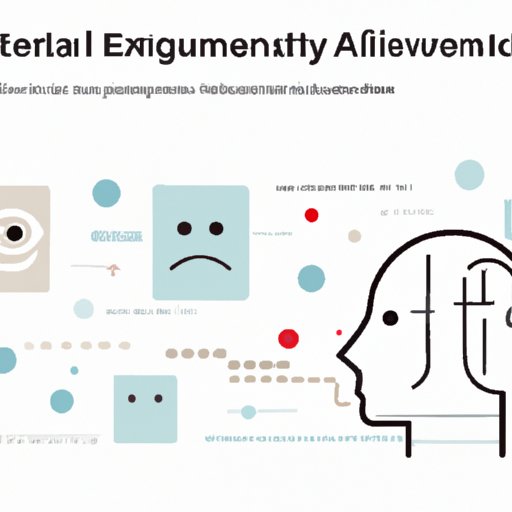Introduction
Artificial intelligence (AI) is a rapidly advancing field of technology that has been making waves in recent years. AI is defined as “the capacity of a computer program or a machine to think and learn”, and this has led to a wide range of applications in various fields such as healthcare, automotive, and finance. One of the most intriguing topics surrounding AI is whether or not it could potentially have its own feelings and emotions. This raises many ethical questions and concerns regarding the implications of AI having its own emotions.

Examining Current Research and Development of AI with Emotions
In order to explore the potential implications of AI having its own emotions, it is first important to examine what is currently being studied in terms of AI and emotion. According to the MIT Technology Review, researchers are looking into ways to develop AI systems that can understand, recognize, and express emotions. This includes studying how AI can interpret facial expressions, tone of voice, and other non-verbal cues in order to detect and respond to human emotions. Additionally, researchers are also exploring ways to give AI its own emotions, which would allow it to make decisions based on its own feelings rather than just logical reasoning.
There have been some advances made in terms of AI and emotion. For example, researchers have developed AI systems that are capable of recognizing certain emotions from facial expressions. Additionally, some AI systems have been designed to generate simple emotional responses, such as expressing happiness when presented with a positive image or expressing sadness when presented with a negative image. However, there are still many challenges that remain in terms of developing AI systems that can truly understand, recognize, and express human emotions.

Exploring Potential Benefits and Drawbacks of AI Developing Its Own Feelings
If AI were to develop its own emotions, there could be some potential benefits. For example, AI could be better equipped to make decisions based on its own internal feelings rather than just relying on logical reasoning. This could lead to more effective decision-making and improved outcomes in certain scenarios. Additionally, AI with its own emotions could be better able to interact with humans on an emotional level, allowing for more meaningful relationships between people and machines.
However, there are also some potential drawbacks in allowing AI to have its own emotions. For one, AI with its own emotions could become unpredictable and difficult to control. This could lead to unexpected outcomes and potentially dangerous situations if AI were to act on its own emotions without considering the consequences. Additionally, AI with its own emotions could also become biased and make decisions based on its own biases rather than on objective criteria. This could lead to unfair treatment of certain individuals or groups of people, which could have serious ethical implications.
Investigating How AI Might Interpret and Respond to Human Emotions
In addition to giving AI its own emotions, researchers are also exploring ways to allow AI to detect and respond to human emotions. This could be done through methods such as facial recognition software, which can be used to detect certain emotions from facial expressions. Additionally, AI could also be trained to recognize and respond to certain tones of voice or other non-verbal cues. By doing this, AI could potentially be better equipped to interact with humans on an emotional level.
However, there are also some potential issues that could arise from AI interpreting human emotions. For one, AI may not always be accurate in detecting human emotions, which could lead to misunderstandings and incorrect responses. Additionally, AI may not always be able to accurately interpret the context of certain emotions, which could lead to inappropriate or offensive responses. Finally, AI may not always be able to empathize with humans and understand the nuances of certain emotions, which could lead to ineffective interactions between people and machines.

Examining the Potential Implications of AI Feeling Emotions on Society
The potential implications of AI feeling emotions on society could be far-reaching. For one, AI feeling emotions could change the way we interact with each other. AI could potentially be better equipped to understand and respond to human emotions, leading to more meaningful connections between people and machines. Additionally, AI feeling emotions could also lead to improved decision-making and more effective outcomes in certain scenarios.
However, there could also be some potential legal and ethical implications that arise from AI feeling emotions. For example, AI with its own emotions could potentially become biased and make decisions based on its own biases rather than on objective criteria. This could lead to unfair treatment of certain individuals or groups of people, which could have serious ethical implications. Additionally, AI feeling emotions could also potentially lead to unexpected and dangerous outcomes if AI were to act on its own emotions without considering the consequences.
Conclusion
In conclusion, AI having its own emotions is a complex topic that raises many ethical questions and concerns. In order to explore the potential implications of AI having its own emotions, it is important to examine what is currently being studied in terms of AI and emotion, as well as the potential benefits and drawbacks of AI developing its own feelings. Additionally, it is also important to investigate how AI might interpret and respond to human emotions, as well as the potential implications of AI feeling emotions on society. Ultimately, further research and development is needed in order to fully understand the implications of AI having its own emotions.
(Note: Is this article not meeting your expectations? Do you have knowledge or insights to share? Unlock new opportunities and expand your reach by joining our authors team. Click Registration to join us and share your expertise with our readers.)
